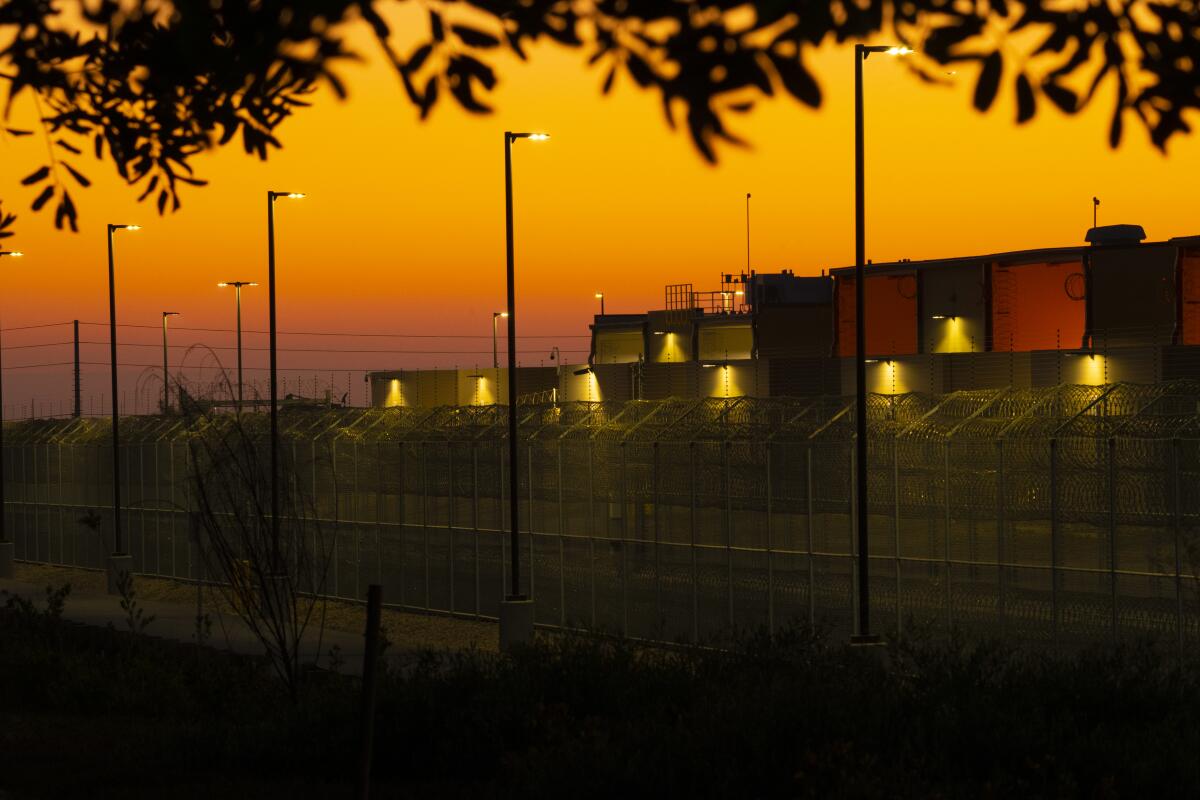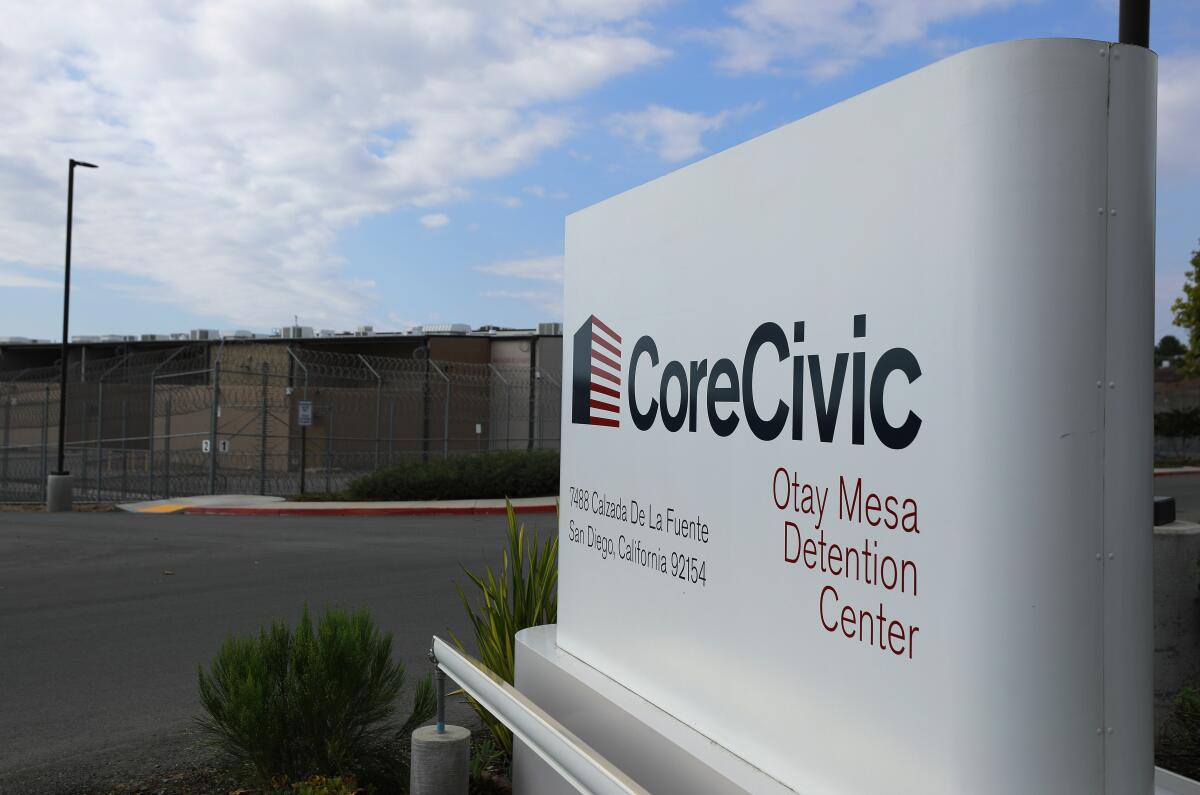ICE detainees allege retaliation for speaking about medical conditions at Otay Mesa center

- Share via
Weeks after writing an op-ed for the San Diego Union-Tribune about his experience in immigration custody, Erik Mercado, a detainee at Otay Mesa Detention Center, was suddenly moved to a different facility in the middle of the night, he said.
He and a couple dozen detainees were sent with shackles on their waists and legs on a bus to Nevada, Mercado said. He said they weren’t able to use the bathroom during the entire trip.
On the way, all he could think about was that now he wouldn’t be able to get the medical treatment he was supposed to have for a newly diagnosed liver condition, he said.
His mind went to the possibility of dying in custody. “I was thinking the worst,” he said in a phone call with the Union-Tribune.
A collective of seven immigrant rights organizations helped Mercado and four other men file a complaint last week with the Department of Homeland Security Office of Civil Rights and Civil Liberties alleging that their transfers were retaliation for their activism while in immigration custody. The sudden move of these five detainees appears to be part of a larger pattern of retaliatory transfers that attempt to silence people in immigration custody who try to raise awareness about conditions, according to the organization Freedom for Immigrants, which works to end immigration detention.
Mercado, in particular, has long advocated inside detention for better medical care, including for access to the treatment he needed.
In a report published in mid-February, the group Freedom for Immigrants found that Immigration and Customs Enforcement frequently transfers people who have participated in complaints, spoken with media or organized hunger strikes about facility conditions.
The report found that many of these detainees experienced “circular” transfers, or being transferred multiple times between the same facilities. It also found that the conditions during these transfers could amount to torture.
A similar complaint was made about the facility in August 2021 when several organizations alleged that immigration detainees faced several kinds of retaliation at five detention locations, including the San Diego facility, after they protested conditions.
Immigration and Customs Enforcement did not respond to a request for comment. In agency documentation about transfer procedures, it says that transfers can happen “for a variety of reasons” and “will not be retaliatory.”

CoreCivic, the private prison company that owns and operates Otay Mesa Detention Center, denied the claims and allegations related to its facility made in the complaint.
“The dedicated professionals at our Otay Mesa Detention Center work to provide immigration detainees a variety of services from comprehensive medical and mental health care to faith-based support and access to legal resources while they prepare for the next steps in their immigration process,” said Brian Todd, public affairs manager for CoreCovic. “The reality is that we provide a safe, humane, and appropriate environment for those entrusted to us at this facility and are constantly striving to deliver an even better standard of care.”
Todd added that CoreCivic has no say in transfers, that the decision is entirely up to ICE. He also noted that the company could not comment on the medical treatment of any particular individual for privacy reasons.
After the transfer in November, Mercado found himself in a county jail in Pahrump, Nev., even though he is not in criminal custody. Immigration is considered a civil legal matter, not a criminal one, but ICE often pays county jails to hold some of its detainees.
Capt. David Boruchowitz of the Nye County Sheriff’s Office, which operates the facility where Mercado is being held, said the office is investigating allegations about the jail that are also made in the complaint. There were 55 ICE detainees being held there as of Wednesday morning, he said.
Mercado believes there are two reasons why he was abruptly moved. First, he has long been outspoken about conditions inside Otay Mesa Detention Center.
Mercado in particular has spoken with the Union-Tribune several times, including when fellow Otay Mesa detainee Carlos Ernesto Escobar Mejia became the first person in immigration custody to die from COVID-19 in 2020. Mercado spoke again with the Union-Tribune about allegations of sexual misconduct against a guard at the facility, and he participated in a complaint reported by the Union-Tribune over allegations of medical malpractice against a psychologist in the facility’s medical unit. He even was a co-author of an opinion piece for the Union-Tribune in which he discussed the alleged retaliation for speaking up about conditions.
Mercado also believes that he was moved so that ICE and CoreCivic could avoid paying to treat his worsening liver condition, which was caused by his hepatitis C that he says facility medical staff told him for years was under control.
“I believe there were several of [the transferred men] that needed urgent medical treatment,” Mercado said. “I was one of them.”
He said that every time he has been transferred, he has had to start over on his requests for medical attention, reliving the lengthy and slow process for referrals to run the same tests he has already had.
Even before he left Otay Mesa on the day of the transfer, he said, he emphasized to officials that he had pending, urgent medical treatment. But his medical records were not transferred with him, according to the complaint, nor were the records of any of the detainees. He pushed for the facility to request his records from Otay Mesa, but even after they arrived, he said he wasn’t able to get the care he needed.
He said he was told after arriving at Nye County Detention Center, west of Las Vegas, that the hospitals there won’t treat him.
“I asked [the ICE officer], ‘Well, then, why did you guys transfer me?’ and he said, ‘I don’t have an answer for that, but you’re not going to get treated in this state,’” Mercado said. “That’s one of the things that is very stressful and painful for me to deal with psychologically and of course physically.”
He said after his latest complaint about retaliation was made public recently, facility officials told him that he would soon be taken to a hospital in Las Vegas for treatment.
Conditions at Nye County were shocking to him, even as someone who has seen several immigration detention facilities, according to the complaint. The complaint says that when he first arrived, there weren’t enough beds, so he had to sleep on the floor by the urinal.
He was also verbally attacked by a guard who discriminated against him because of his religious beliefs as a Jewish person, he said. An official from the Immigration Detention Ombudsman’s office happened to be present at the time, and the guard is no longer working at the facility, Mercado said.
He said he is feeling worn down by the system and the way it has treated him. He’s been in immigration detention for more than three years.
“I feel like everybody is just not willing to listen to me or care for me,” he said right before the jail’s phone system abruptly ended the call with the Union-Tribune.
More to Read
Updates
11:49 a.m. March 7, 2023: This article was updated with information from Immigration and Customs Enforcement
Sign up for Essential California
The most important California stories and recommendations in your inbox every morning.
You may occasionally receive promotional content from the Los Angeles Times.











